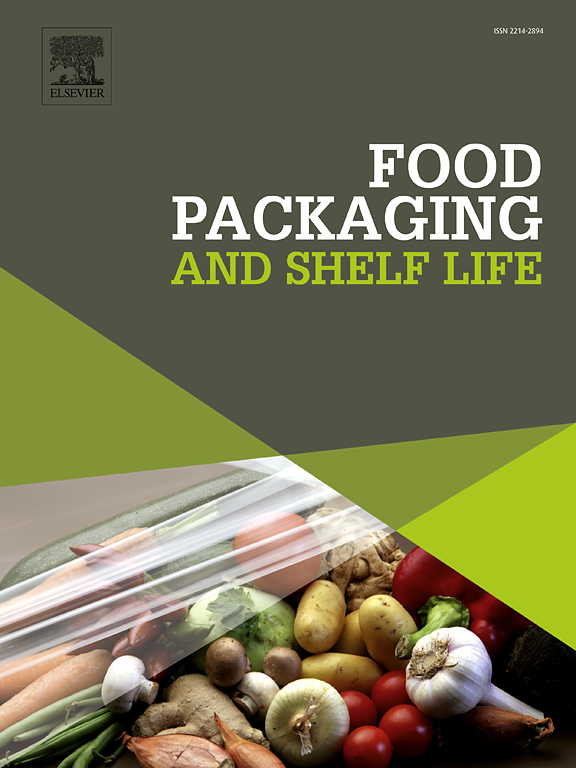稀土掺杂ZnO复合涂层的抗菌性能及其对鲜橙保质期的影响
IF 8.5
1区 农林科学
Q1 FOOD SCIENCE & TECHNOLOGY
引用次数: 0
摘要
添加稀土金属或金属氧化物可以增强食品级氧化锌颗粒的抗菌性能。研究已经证明了稀土金属通过ROS生成和光催化改善抗菌作用的有效性,然而,很少有研究尝试对其抗菌应用,如食品保鲜。本文以巴西棕榈蜡、吐温-80和油酸为基材,制备了一种La-Ce-ZnO复合涂层,并对其抗大肠杆菌和膨胀青霉的效果进行了研究。制备的La-Ce-ZnO粉体具有均匀的微尺度颗粒,在紫外可见光谱中有红移,表明稀土元素嵌套在基体中。结果表明,开发的涂层可以减少>; 2.5 log大肠杆菌的体外附着。以新鲜的爱源38号橙为模型食品,发现稀土掺杂氧化锌对大肠弧菌和天然微生物均有显著的抑制作用,其中稀土掺杂氧化锌含量为2 %。在25天的储藏过程中,质量评价表明,涂层对橙子的重量损失和硬度没有影响,但会加速颜色的退化。此外,4 % La-Ce-ZnO复合涂层对橙子的抗菌活性和品质的影响更为严重。本研究结果有助于进一步了解镧、铈等稀土元素的抑菌机理,拓展其在食品中的应用潜力。本文章由计算机程序翻译,如有差异,请以英文原文为准。
Antimicrobial capacity of rare earth-doped ZnO composite coating and its influence on fresh orange shelf life quality
Antimicrobial capacity of food grade ZnO particles can be enhanced by doping rare earth (RE) metal or metal oxides. Studies have demonstrated the effectiveness of RE metals to improve antimicrobial actions through ROS generation and photo-catalysis, however, few investigations have been attempted on its antimicrobial applications, such as in food preservation. In this work, we developed a La-Ce-ZnO containing composite coating based on carnauba wax, Tween-80 and oleic acid, and examined its effectiveness against Escherichia coli and Penicillium expansum. The La-Ce-ZnO powder was characterized to be uniform micro-size particles with a red shift in UV-Vis spectra showing the imbedding of RE within the matrix. Results showed that developed coatings can reduce > 2.5 log E. coli attached in vitro. Using fresh Aiyuan 38 orange as model food, significant inhibition against P. expansum and natural microorganisms were also observed, particularly for 2 % inclusion of the RE doped ZnO. Quality evaluation during 25 days storage revealed that coatings did not affect orange weight losses and firmness, whereas caused faster deterioration in color. Additionally, decreased antimicrobial activities and impact on orange quality were more severe when used 4 % La-Ce-ZnO in the composite coating. Findings in this study can be useful to further understand the antimicrobial mechanisms of La, Ce or other RE elements, and expand their potentials in food applications.
求助全文
通过发布文献求助,成功后即可免费获取论文全文。
去求助
来源期刊

Food Packaging and Shelf Life
Agricultural and Biological Sciences-Food Science
CiteScore
14.00
自引率
8.80%
发文量
214
审稿时长
70 days
期刊介绍:
Food packaging is crucial for preserving food integrity throughout the distribution chain. It safeguards against contamination by physical, chemical, and biological agents, ensuring the safety and quality of processed foods. The evolution of novel food packaging, including modified atmosphere and active packaging, has extended shelf life, enhancing convenience for consumers. Shelf life, the duration a perishable item remains suitable for sale, use, or consumption, is intricately linked with food packaging, emphasizing its role in maintaining product quality and safety.
 求助内容:
求助内容: 应助结果提醒方式:
应助结果提醒方式:


